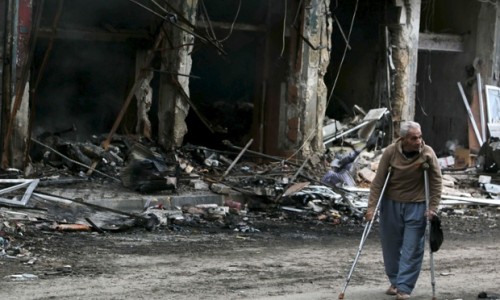Zaina Erhaim, a resident of Idlib, writes on her website about finding her family, returning to the city — and then leaving again — after last month’s takeover by rebel forces:
It has almost been 4 years since I was there. I absolutely remember August 2011, demonstrating at the sunset with my mother and female friends while wearing a red niqab so I was not recognised by the [pro-Assad] thugs.
Because of my loud voice and excitement, I found myself becoming the women’s demonstration cheerleader. We chanted for freedom and martyrs.
We then thought about chanting what was the main slogan in some cities in Syria, “Syrians are one, Sunnis, Christians, Alawites, and Druze”. We didn’t, fearing that some conservatives joining would not chant behind us. However, suddenly they themselves started chanting it — I remember how low and stupid I felt because I doubted my own people.
That seems like a life-old dream. Everything has changed. My family fled the city where they lived all their lives after repeated interrogations by the security forces. My mother was kicked out of her job as a teacher’s trainer and university lecturer, and fled to Turkey.
I hadn’t thought once, “I’ll be alive to see it again.” Even after going back, I still feel it’s a hallucination and I’ll wake up to find myself forbidden from going home again for demanding my human rights and freedom.
I decided to go back from the first moment I heard the regime troops withdrew on March 28. I headed from Aleppo. Before the revolution the trip by road took an hour, but now as we have to avoid the Islamic State-captured towns in the northern Aleppo suburbs, as well as the regime-held ones, it takes 3 to 4 hours.
I was still in denial and suppressed all my feelings, focusing on finding my family members who are still in Idlib and taking them to a safer area. There are no means of communication in the city and nearby towns. The regime even cut off the landlines, so for 3 days, about half a million people were completely off-line.
We were the only civilian cars moving toward Idlib city, all the others were running away from it, long queues of families stuffed and folded into the vehicles. I was searching the faces, hoping to see a familiar one, but couldn’t recognise any.
We stopped the car on the sidewalk of the street. I ran toward some families sitting on the street and asked them what’s going on inside. They told me that civilians are fleeing walking because few cars dared to move, and then when leaving Idlib, they had been picked up by mini buses sent by rebels to take them to other towns.
All the nearby towns such as Binnish, Maart Misreen, Saraqeb, and Sarmin have been heavily shelled, and every mortar kills, as displaced families are lost, grouped in streets to absorb what happened and find a place to go to. The families of the rebels, who fled Idlib, as I did 4 years ago, were the main hosts. In Salqin near the Turkish boarder, houses were overcrowded: in one two-room house, 7 families with more than 15 kids spent the night. The host, Abdul Halim, told me, “I’ll keep my house open to all who come, even if I had to sleep in the street myself” — he didn’t, but they had to sleep by turns that night because there is no enough space for all.
After a day of searching, asking checkpoints and people leaving Idlib, I finally found my family and put them in a safe place to go back to the city.
(Featured Photo: Mahmoud Hebbo/Reuters)

